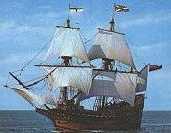For the basic story of After the Mayflower, A Truer Picture of Native America gives a good summary. For further reading on the subject, see
Tisquantum, Massasoit, and Hobbamock
King Philip's War
Note: In some cases, I've quoted or paraphrase what I heard on After the Mayflower. In other cases, I've interpreted it. But everything here comes from After the Mayflower, not another source. If other sources disagree with these interpretations and implications, that's a problem for another day.
Wow. Right there is a strong rationale for the Indians' hostility toward the English. The Anglos were invading their homeland without permission with the intent to kill or enslave them. I'd say that was sufficient justification for the Indians' acts of warfare--even their preemptive strikes.
To reiterate, the English knew or should've known that the Indians considered them trespassers. That they had no moral or legal right to land without getting the inhabitants' permission. Therefore, any adversity they suffered was basically their own fault.
Again, this is interesting if you think about it. The Indians were aware that their way of life was at risk. They knew that the English had wreaked havoc before. Although Massasoit made a reasonable choice--to accommodate the English--the other Wampanoags were ultimately right. They would've been better off if they had eliminated the colonists from their shores.
For more on the subject, see Native Documentaries and News.
Below: "So what if we've killed or enslaved Indians before? We're Englishmen, so we can do whatever we want."


1 comment:
"Right there is a strong rationale for the Indians' hostility toward the English. The Anglos were invading their homeland without permission with the intent to kill or enslave them. I'd say that was sufficient justification for the Indians' acts of warfare--even their preemptive strikes."
Mass murder is never justified; also if you believe that then you should also think that Dresden was justified.
Post a Comment